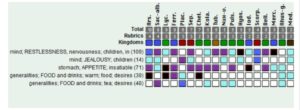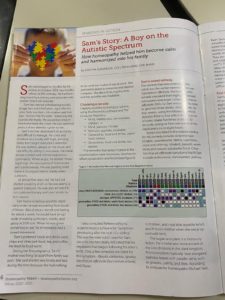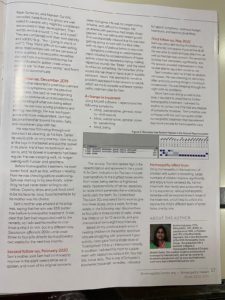How homeopathy helped him become calm and harmonized into his family
by KAVITHA KUKUNOOR, CCH, RSHom(NA), CHP, BHMS
Sam was brought to my clinic by his mother in October 2019, two months before his fifth birthday. He had been diagnosed by a primary care physician with Autistic Spectrum Disorder.
Sam had started withdrawing socially at age two and a half years, right after his sister Sally was born. His mother said that Sam “did not like his sister,” especially the sounds she made. He would become irritated whenever she cried. He also seemed jealous of any attention given to her.
Sam’s mother described him as cranky and difficult to manage. He cried and shrieked very loudly with high, piercing tones that caught everyone’s attention. He was restless, always on the move, and had difficulty sitting in one place. He made no eye contact and did not respond to commands. When angry, he started throwing things. He was scared of loud noisest to do while her husband was at work. She yearned to speak to someone and desired company. She ate a lot during this time, and her appetite was insatiable.
Choosing a remedy
I repertorized the following symptoms, using MacRepertory software and The Complete Repertory:
• Mind, restlessness, nervousness, children, in
• Mind, jealousy, children
• Stomach, appetite, insatiable
• Generalities, food and drinks, warm food, desires
• Generalities, food and drinks, tea, desires
The remedies that ranked highest in the repertorization were Arsenicum, Saccharum album, Lycopodium, and Ferrum.

Sam’s sweet remedy
The remedy that was common to this rubric and the earlier repertorization was Saccharum officinale, the homeopathic remedy prepared from highly diluted and succussed cane sugar. I chose Saccharum officinale 200c for Sam and asked his mom to give him three doses, once a week, for four weeks, using the following method: dissolve three to four pills in three ounces of water, shake five times or stir for 10 seconds, and give Sam one ounce of this liquid every six to eight hours.
Symptoms listed in the materia medica for this remedy include violent temper, irritable, quarrelsome, dainty, capricious, cross and whining, bloated, peevish, wants titbits and refuses substantial food. Other Saccharum officinale symptoms that fit Sam include restlessness, nervousness, jealousy and startled easily. He was partially toilet trained, having accidents mainly when outdoors.
At almost five years old, he had not started speaking at all, so he was seeing a speech therapist. He was also enrolled in occupational therapy and special education classes.
Sam had a voracious appetite, especially when he was recovering from bouts of illness. About once a month and lasting f or about a week, he would have an episode of waking up hungry, cranky, and
Figure 1: Remedies that Ranked Highest in the First Repertorization gassy at 3:00 a.m. When he was given something to eat, he immediately had a bowel movement.
Sam’s preferred foods and drinks were chips and other junk food, tea, and coffee. He liked his food warm.
During her first pregnancy, Sam’s mother was living far apart from family support. She said she felt very lonely and lazy during this time because she had nothing
I also consulted ReferenceWorks materia medica software for “symptoms developing after the birth of a sibling.” This was the main rubric used for Sam, since his mother clearly indicated that his regression had begun following his sister’s birth. Only a few remedies are listed for this symptom—Baryta carbonica, Ignatia, Saccharum officinale (Saccharum album), and Sepia. in children, and insatiable appetite (which also fit Sam’s mother when she was pregnant with him).
The sugarcane plant is a monocotyledon, the smaller and more ancient of the two divisions in the plant kingdom. Monocot plants typically have elongated, stalkless leaves with parallel veins, such as grasses, palms, and lilies. According to analyses by homeopaths Michael Yakir, Rajan Sankaran, and Mahesh Gandhi, remedies made from this group are well suited to people who might be considered less evolved in their development. Their worlds revolve around “I, me, and myself.” They are concerned with their own stability and solidity (e.g., “Am I going to stand or not?”). They find it difficult to make lasting, deep relationships with others because of these qualities. Homeopathic remedies derived from monocotyledons may be more indicated in autism cases where patients are “in their own world,” and find it difficult to communicate.
First follow-up, December 2019 Sam’s mother reported a great improvement in her son’s symptoms over the previous eight weeks. She said he was beginning to listen to commands and showed more understanding of what was being asked of him. He was now solving problems and learning new things. He was less hyperactive and more independent. Sam had become friendlier toward his sister, Sally, and would even play with her were now gone. He was no longer cranky, irritable, and difficult to manage. His problems with gassiness had largely disappeared. He was eating and sleeping well. She was especially pleased that he was now getting along so well with his little sister, with no signs of jealous behavior anymore.
Symptoms continuing to need improvement included his occasional bouts of hyper activity shown by repeated jumping, making repetitive sounds like “Eeee!” and the need to chew on something. He had a fear of the sound of a hair dryer or hand dryer in a public restroom. Issues that seemed to remain a problem appeared to be sensory in nature, which led me to consider a different homeopathic treatment plan for Sam.
A change in treatment Using RADAR software, I repertorized the following symptoms:
• Mind, oversensitive, general, noise to – shrill sounds
• Mind, oversensitive, general, noise to – penetrating
• Mind, biting
for gastric symptoms, ravenous hunger, heartburn, and learning disabilities.

Third follow-up, May 2020
Sam was very calm during this follow-up visit and did not appear hyperactive at all. He was able to listen and pay attention, as well as maintain eye contact. His sensitivity to noise had decreased significantly, too. His speech showed improvement in that he was able to say a few words to me.
Sam’s mother said he’d had no abdominal issues. He was chewing on items less often and only putting things in his mouth occasionally. He was sleeping through the night with no problems.
Since Sam was doing so well at this time, I decided to prescribe no further homeopathic treatment. I advised his mother to contact me if he had any relapse of symptoms, however. Sam’s mother was so happy with her son’s progress under homeopathic treatment that she referred two more people for homeopathic care.
He was now following through with tasks such as cleaning up his toys. Earlier he would pick up only one toy; now he put all the toys in the basket and put the basket in its place. He’d had no bathroom accidents, and his bowel movements had been regular. He was sleeping well, no longer
Figure 2: Remedies that Ranked Highest in the Second Repertorization
waking with hunger and gassiness. Before homeopathic treatment, he swallowed food, such as rice, without chewing. Now he was chewing before swallowing. Sam was starting to try new foods, something he had never been willing to do before. Crunchy chips and junk food used to be his favorite; now, food homemade by his mother was his choice.
Sam’s mother was amazed at his progress, saying that her son was 85% better than before homeopathic treatment. It was clear that Sam had responded well to the remedy, so I advised his mother to con tinue giving it to him, but in a different way: Saccharum officinale 200c—one dose (three to four pills directly by mouth) every two weeks for the next two months.
Second follow-up, February 2020 Sam’s mother said Sam had continued to improve in the eight weeks since we’d spoken, and most of his original concerns
The remedy Theridion ranked high in the repertorization and appeared to be a good fit for Sam. Indications for Theridion include over-sensitivity to the slightest noise; anxiety from noise; being startled or frightened easily; hypersensitivity of nerves, especially to noise which penetrates the whole body, particularly the teeth. So, I prescribed Theridion 30c and asked Sam’s mom to give him three doses, once a week, for three weeks in the following way: dissolve three to four pills in three ounces of water, shake five times or stir for 10 seconds, and give one ounce at six-to-eight hour intervals.
Based on my previous experience in treating children on the autistic spectrum who are struggling with prominent hyper activity, I also gave Sam a single dose of Tuberculinum 1M as an intercurrent remedy. In addition, I advised his mom to supplement with Natrum muratricum 6X, four tablets, twice daily.
This is one of Schussler’s biochemic tissue salt remedies, indicated Homeopathy offers hope Using homeopathy in the treatment of children with autism is rewarding. Large numbers of children improve significantly and enjoy a more centered life, harmonized with their family and surroundings. In my experience, various homeopathic remedies will be required at each stage of the treatment, which help to unfold and resolve the child’s different layers of symptoms, one by one.
ABOUT THE AUTHOR:
Kavitha Kukunoor, CCH, RSHom(NA), CHP, BHMS, in practice since 1995, is President and CEO of Kavitha Holistic Approach. She is also the founder of the KHA Homeopathy Study Group. She graduated with a bachelor’s degree in Homeopathic Medicine & Surgery (BHMS) (India). She mentors students and lectures on homeopathy internationally, and can be reached at Kavithakhomeo@gmail.com or
www.kavithakhomeo.com/www.beyondthelimitskukunoor.com.


Credit: Thank you to National Center for Homeopathy for publishing in Homeopathy Today

